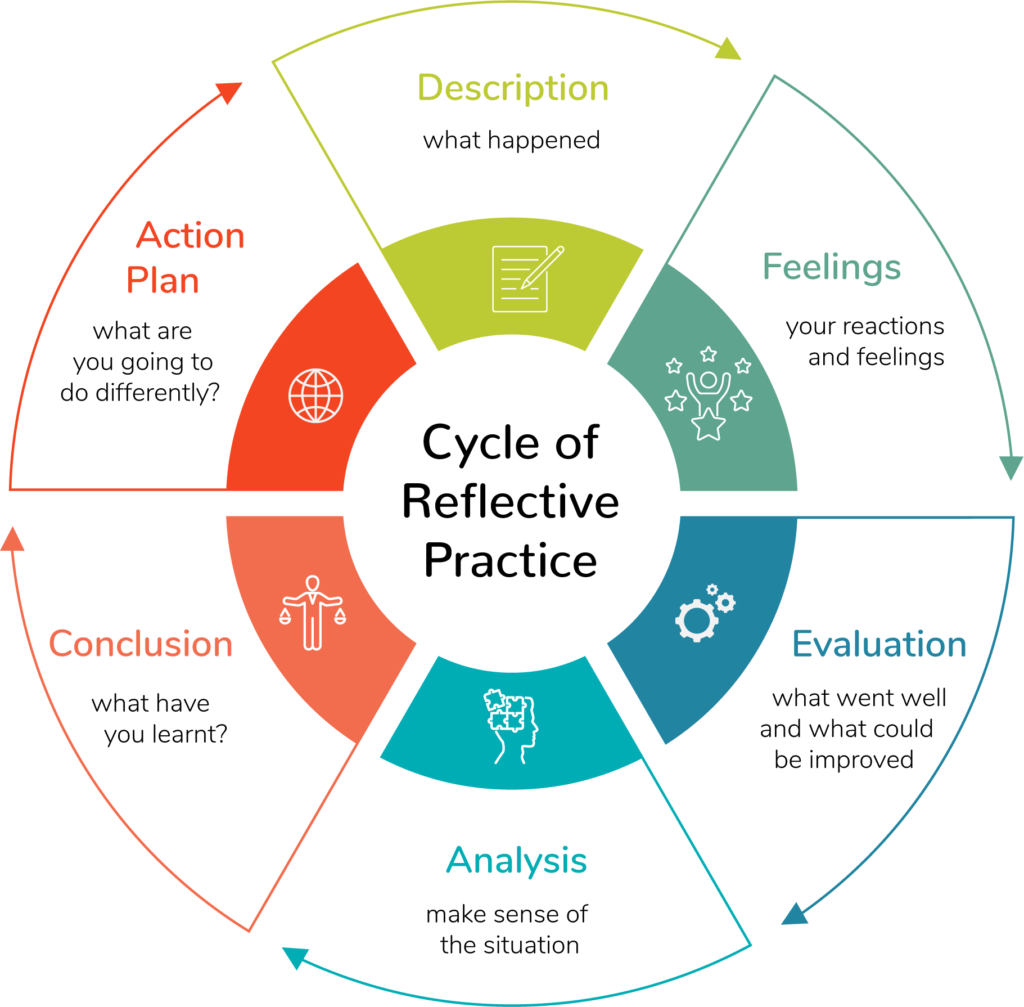Do you go from week-to-week, project-to-project or even job-to-job without taking a backward glance? Without taking time for reflection you may be loosing opportunities for personal and professional development, or the chance to learn from past experiences.
What is reflective practice?
Reflective practice is a process of consciously reviewing your experience of an event or situation, either for individual projects or as a regular recurring cycle, in order to improve your actions and professional practice.
Joseph A. Raelin, in his article‘”I don’t have time to think” versus the art of reflective practice’, defines reflection as:
‘the practice of periodically stepping back to ponder the meaning of what has recently transpired to ourselves and to others in our immediate environment. It illuminates what the self and others have experienced, providing a basis for future action.’
Specifically, it involves looking at how and why we think and behave in a particular circumstance. It is about being conscious and aware of our actions and their consequences. It also guides us to question what we know and how we have come to know it.
The Cycle of Reflective Practice is a six-stage model (originally developed by Graham Gibbs), with each stage providing an opportunity to reflect on an element of particular event, situation or project.
- Description
- Feelings
- Evaluation
- Analysis
- Conclusion
- Action plan

Where most workplace performance or project reviews cover steps 1, 3, 4 & 5, reflective practice also includes reflection on the feelings and values you experience in the situation, as well as including lessons and conclusions back into action plans. As much as some would like to try, no-one can operate in a workplace and leave their feelings and values at the door.
The key with reflective practice is to consider how your feelings, values, behaviours, judgements and actions impacted the situation, and if there was a better way to approach the things.
How to develop reflective practice attitudes and attributes
People who have a growth mindset often possess the attitudes and attributes for reflective practice. Conversely a closed mindset is often closely linked with a reluctance to reflect on self and situations.
Attitudes
American philosopher John Dewey was an advocate of reflective practice and saw it as a vital part of what enabled us to learn from experience. He outlined three key attitudes that form the basis of reflective practice.
- open-mindedness: a willingness to consider new evidence as it occurs and to admit the possibility of error. This attitude involves being open to other points of view, appreciating there are many ways of looking at a particular situation or event, and staying open to changing your own viewpoint. Part of open-mindedness is being able to let go of needing to be right or wanting to win.
- responsibility: careful consideration of the consequences of your actions, especially as they affect others. It is the willingness to acknowledge that whatever you choose to do will impact on the lives of others in both foreseen and unforeseen ways.
- wholeheartedness: a commitment to seek every opportunity to learn and a belief that one can always learn something new.
Attributes
As well as the attitudes of open-mindedness, responsibility and wholeheartedness, there are 10 personal attributes that are common across people that actively pursue reflective practice.
- reflect on and learn from experience
- engage in ongoing inquiry
- solicit feedback
- remain open to alternative perspectives
- assume responsibility for their own learning
- take action to align with new knowledge and understandings
- observe themselves in the process of thinking
- are committed to continuous improvement in practice
- strive to align behaviour with values and beliefs
- seek to discover what is true
Benefits of reflective practice
Regular reflective practice helps increase awareness of how you approach a range of situations (your personal lens). Pursuing reflective practice maybe something you do as a structured requirement of your role, or an element of personal development. In either case, there are a range of benefits in making the practice part of your routine, including:
- supporting a greater level of self-awareness about the nature and impact of your work performance
- an opportunity for professional growth and development
- helping learning and strengthening your capacity in a team
- bringing rigour to critical thinking
- honing communication skills
Ways to go about reflective practice
Unless you deliberately and regularly carve out time to engage in reflective practice, circumstances may pull you off course from your centre – from who you are and what matters to you. There are a wide range of activities that can be used to support a reflective practice approach. Some of these include:
- self and peer assessment
- problem-based learning
- personal development planning
- coaching or mentoring sessions
- project reviews (also known as retrospectives or retros)
- team/group reflection
We often assume that workplace learning is a specific, discreet activity which involves reading books, attending courses, or watching a presentation. In fact we are learning all the time. Every interaction we have, project we do, or each job we have contains strands of information that help guide how we approach things in the future. Reflective Practice is a way of recognising and articulating what we’re learning on a moment-by-moment basis and guiding a conscious decision to take action to improve our future performance.

